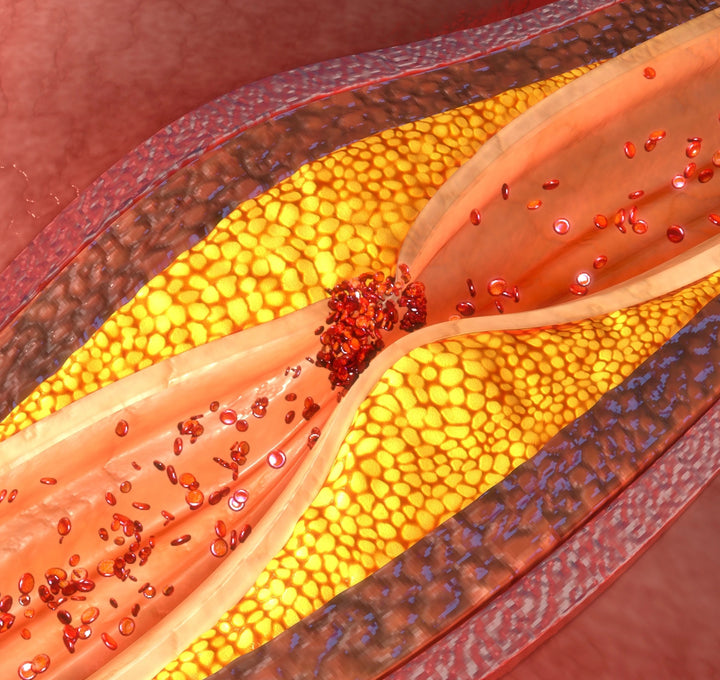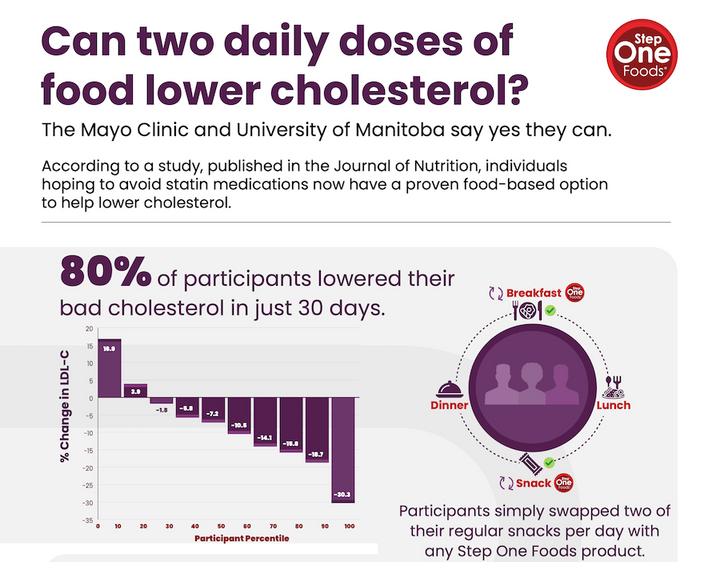

How To Lower Your Cholesterol Naturally
Looking to lower cholesterol levels and improve your heart health? Understanding what cholesterol is and the role it plays in health and disease is an important first step.
Quick Links:
✅ Medically reviewed by Elizabeth Klodas, MD FACC
Last Updated: May 2022✅ Medically reviewed by Elizabeth Klodas, MD FACC
Last Updated: May 2022What is Cholesterol?
Cholesterol is a waxy, fat-like substance that your body needs to do things like build cells, create hormones and make bile (which helps us digest food). While cholesterol is essential for various bodily functions, most of us have too much of it.
There are two sources of cholesterol circulating in our blood:
- Intrinsic cholesterol – manufactured inside your body, this makes up the majority of what’s measured in a cholesterol test.
- Dietary cholesterol – enters the body through certain foods you eat, such as red meats, eggs and high-fat dairy products.
Read more: What you need to know about cholesterol.
Why Does High Cholesterol Matter?
Too much cholesterol in your blood can build up in the artery walls. This buildup, known as “plaque,” narrows your blood vessels and blocks blood from flowing to and from your heart and other organs. The result is an increased risk of heart disease, heart attack, peripheral vascular disease and stroke.

Do Not Ignore High Cholesterol
Step One Foods Founder and Chief Medical Officer, Dr. Elizabeth Klodas explains how cholesterol is linked to heart disease events and risks.
How to Support Healthy Cholesterol Levels
You can lower cholesterol levels without, or beyond, medications. Healthy lifestyle choices, including diet, exercise and stress management, can impact cholesterol levels and improve your health.
Eat a Heart-Healthy Diet
Eating to support healthy cholesterol is step one to better health. A heart-healthy diet includes fiber, omega-3 fatty acids, antioxidants and plant sterols, and avoids animal-based saturated fats, trans fats and simple/processed carbohydrates.
Exercise Regularly
Physical activity helps improve cholesterol levels and decreases your risk of heart disease, stroke and diabetes. Just 20 minutes of somewhat vigorous activity each day can make a real difference.
Manage Stress
Over time, high stress can lead to high cholesterol and even heart disease. Taking steps to address stress can help protect your heart and improve your overall health. This might include exercise, relaxation techniques, increased social activity and a practice of cultivating joy.
>> Learn more about how Step One Foods can help naturally lower cholesterol.

Which Foods Lower Bad Cholesterol?
Step One Foods founder and Chief Medical Officer, Dr. Elizabeth Klodas.
Dr. Klodas reviews facts about heart-health in the US, and also new clinical research about Step One Foods.
Types of Cholesterol
Measuring and managing cholesterol levels is critical for maintaining and improving heart health. Cholesterol is carried in your bloodstream in particles called lipoproteins – these particles are what are measured in a cholesterol test. There are two types:High-density lipoprotein (HDL)
Think of HDL as the “Happy” or good cholesterol. This particle is used in the formation of hormones and is not depositing in your arteries. You want the majority of your total cholesterol in the HDL form – this is the number you want to keep high.Learn how to raise HDL.
Low-density lipoprotein (LDL)
Consider LDL to be the “Lousy” or bad cholesterol. It’s the form that can deposit in your arteries and cause blockages. LDL is what cardiologists obsess over and is the major target for cholesterol treatment – this is the number you want to keep low.Learn how to lower LDL.
Triglycerides
Triglycerides, a type of fat in the blood, are also important when it comes to cholesterol’s impact on heart health. A high level of these particles, combined with high LDL (lousy) cholesterol or low HDL (happy) cholesterol, increases the risk of heart attack and stroke.Learn how to lower triglyceride levels.
What Causes High Cholesterol?
Genetics can cause some people to have too much cholesterol, but heredity alone is typically not the entire reason. Other lifestyle factors usually coexist and make the numbers worse, sometimes markedly so. Behaviors that can increase your risk for high cholesterol include:
Making healthy lifestyle changes is the first step toward lowering your risk of heart disease.
Read more: 8 Things You Can do to Beat a Genetic Predisposition for Cardiovascular Disease
What’s the Best Diet to Lower Cholesterol?
Eating for health is very different from dieting. While dieting can turn food into an enemy by restricting choice, eating for health allows for endless variety without deprivation.
So what’s the best heart-healthy eating plan to lower cholesterol? Strive to incrementally eat more foods that promote health and fewer foods that promote disease.
What to Eat
Make sustainable changes by finding realistic ways to incorporate more health-boosting foods into your diet, such as:
Healthy eating plans like the Mediterranean Diet and the Nordic Diet are two good examples of this approach. Making healthy lifestyle changes is the first step toward lowering your risk of heart disease.
What Not to Eat
To eat for your heart and lower bad cholesterol, incrementally remove (or drastically limit) foods that promote disease, such as:
>> Learn more: You don’t need to avoid foods with cholesterol…except for these.
How Much Cholesterol is Bad?
Normal cholesterol results vary by age and gender. In general:If you’re 20 years or older, it’s recommended to have your cholesterol tested at least once every five years with the interval decreasing as we age. A good rule of thumb is twice in your twenties, three times in your thirties, four times in your forties, five times in your fifties and yearly thereafter.
Learn how to interpret your cholesterol test results
Healthy Lifestyle Tips
You can take steps to improve your cholesterol levels and reduce your risk of cardiovascular diseases with healthy lifestyle changes, such as:
How changing the way you eat can naturally improve your health
If lifestyle changes alone don’t improve your cholesterol levels, your health care provider may also prescribe cholesterol-lowering medication, such as statin drugs, bile acid sequestrants or fibrates, among others.
Discover when it is ok to try food instead of statins to lower cholesterol
>> Learn more in our Cholesterol FAQs
Further Reading:
- LDL Cholesterol: Particle Size and Number
- No one talks about HDL cholesterol, but it matters
- What should my LDL Levels be?
More Resources:
https://www.cdc.gov/cholesterol/about.htm
https://www.heart.org/en/health-topics/cholesterol/about-cholesterol
https://www.eatright.org/health/wellness/heart-and-cardiovascular-health/what-is-cholesterol
https://my.clevelandclinic.org/health/articles/11920-cholesterol-numbers-what-do-they-mean
